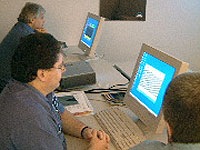

This page is just to provide a basic guideline, that will serve you well in almost all situations. However there are thousands of websites offering free resume advice for specific situations. I have begun posting links to the better ones on my links page.
 What is a Resume? The resume is a selling tool that outlines your skills and experiences so an employer can see, at a glance, how you can contribute to the employer's workplace. Your resume has to sell you in short order. While you may have all the requirements for a particular position, your resume is a failure if the employer does not instantly come to the conclusion that you "have what it takes." The first hurdle your resume has to pass is whether it ends up in the "consider file" or the "reject file"--and this may take less than thirty seconds.
What is a Resume? The resume is a selling tool that outlines your skills and experiences so an employer can see, at a glance, how you can contribute to the employer's workplace. Your resume has to sell you in short order. While you may have all the requirements for a particular position, your resume is a failure if the employer does not instantly come to the conclusion that you "have what it takes." The first hurdle your resume has to pass is whether it ends up in the "consider file" or the "reject file"--and this may take less than thirty seconds.
The most effective resumes are clearly focused on a specific job title and address the employer's stated requirements for the position. The more you know about the duties and skills required for the job-and organize your resume around these points-the more effective the resume.
You will need information to write a good resume. Not just information about jobs you've held in the past but also information to select the most relevant accomplishments, skills and experience for THIS position. The more you know about the employer and the position, the more you can tailor your resume to fit the job.Fundamentals of a Good Chronological Resume-You probably have about 30 seconds to convince a potential employer that you deserve an interview. A resume summarizes your accomplishments, your education, and your work experience, and should reflect your strengths.
What follows is an outline of a typical chronological resume -- best suited for those who have worked in the same or related field. Career changers and those job-seekers with varied work experiences and accomplishments may want to utilize a functional resume style.
Here are the key components of a standard chronological resume:
Identification It is essential that a potential employer can reach you. This section should include your name, address, phone number(s), and e-mail address.
Job Objective
A job objective should be focused on the outline of the position responsibilities as you understand them. To have an objective listed that exceeds the scope of the position generally reduces the chances for an interview. If your objective is to be a Vice-President of Engineering or a Vice-President of Sales and the position is for a Senior Project Engineer or a District Sales Manager you probably won't get the opportunity to interview (even if the compensation for the new position exceeds your expectations). Employers many times will feel that you won't feel challenged or have enough responsibility and they will lose you once that "Vice-Presidency" becomes available.
Key Accomplishments
Some resume experts are suggesting adding a section that highlights your key accomplishments and achievements. Think of this section as an executive summary of your resume; identify key accomplishments that will grab the attention of an employer.
This section should summarize (using nouns as keywords and descriptors) your major accomplishments and qualifications
This section can also be labeled "Professional Profile," "Summary of Accomplishments," "Key Skills," "Summary of Qualifications," or "Qualifications."
Professional Experience
This section can also be labeled "Experience, "Work History," or "Employment." This section should include company name, your job title, dates of employment, and major accomplishments. List experiences in reverse chronological order, starting with your most current experience. If the company is not a household name, some explanation of it's scope and products is appropriate. (i.e. Whizbang Corp- a $50mm manufacturer of electronic widgets sold worldwide.)
List your accomplishments in bullet format (rather than paragraph format). Avoid presenting a litany of job duties or responsibilities, but do give an idea of the scope of the positions held, to include numbers supervised, scope of budget/sales volume/project size, etc. If writing a sales resume, sales volume numbers mean very little except to direct competitors. It is far better to list your sales as a measurement against quota or your peers. (Showing that you sold $20mm of widgets in a year sounds impressive but is not good if the other sales reps sold between $30 and $40mm each. Consistently exceeding quota or ranking in the top 20% year after year is far better. If you were not in the "elite group" of performers, then list the $20mm, but try to emphasize new accounts penetrated, comparison to territory performance in previous years, etc.) Remember-Be honest! Future employers have an uncanny ability to sniff out inconsistencies and exaggerations.If you don't have a lot of career-related job experience for a particular position, consider using transferable skills to better highlight your work experience.
Finally, make sure to make use of action verbs when describing your accomplishments.
Education This section should include schools attended, academic achievements, degrees obtained, specialized courses taken, etc. Generally, GPA's are to be avoided unless truly outstanding. This is also the place to list additional training you have received, and certifications obtained since leaving school. Ongoing courses being taken should be listed as well.
Affiliations/Interests
This section is optional; include only if you have room on your resume for it. Items from this section are often used as an ice-breaker by interviewers looking to start an interview on an informal basis.
This section should only include professional memberships and non-controversial activities/interests.
References
Many experts say this section is passe, but if you have room, include it. If nothing else, this section signals the end of your resume.
This section should only include a statement saying references are available upon request.
Do not include the names of your references on your resume
 PLEASE-- BE CERTAIN THERE ARE NO TYPOS!! Spell-check alone won't take care of it. Have at least two people proof read it and find errors, make suggestions, etc. If there are errors in a document that you have taken so much time with, and which is so important to your career, then what do you think an employer will assume is the quality of paperwork they can expect from you in your new position?
PLEASE-- BE CERTAIN THERE ARE NO TYPOS!! Spell-check alone won't take care of it. Have at least two people proof read it and find errors, make suggestions, etc. If there are errors in a document that you have taken so much time with, and which is so important to your career, then what do you think an employer will assume is the quality of paperwork they can expect from you in your new position?